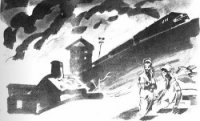Watership Down - Adams Richard George (книги полностью бесплатно .txt) 📗
When he woke, he found that he was alone in the burrow. For a moment he wondered whether Hyzenthlay had been arrested. Then he felt sure that the Owslafa could not have removed her while he slept. She must have woken and slipped back to Thethuthinnang without disturbing him.
It was a little before dawn, but the oppression in the air had not lessened. He slipped up the run to the entrance. Moneywort, the sentry on duty, was peering uneasily out of the mouth of the hole, but turned as he approached.
"I wish it would rain, sir," he said. "The thunder's enough to turn the grass sour, but not much hope of it breaking before the evening, I'd say."
"It's bad luck for the Mark's last day on dawn and evening," replied Bigwig. "Go and wake Captain Chervil. I'll take your place here until the Mark come up."
When Moneywort had gone, Bigwig sat in the mouth of the hole and sniffed the heavy air. The sky seemed as close as the tops of the trees, covered with still cloud and flushed on the morning side with a lurid, foxy glow. Not a lark was up, not a thrush singing. The field before him was empty and motionless. The longing to run came over him. In less than no time he could be down to the arch. It was a safe bet that Campion and his patrol would not be out in weather like this. Every living creature up and down the fields and copses must be muted, pressed down as though under a great, soft paw. Nothing would be moving, for the day was unpropitious and instincts were blurred and not to be trusted. It was a time to crouch and be silent. But a fugitive would be safe. Indeed, he could not hope for a better chance.
"O Lord with the starlight ears, send me a sign!" said Bigwig.
He heard movement in the run behind him. It was the Owslafa bringing up the prisoner. In the thundery twilight, Blackavar looked more sick and dejected than ever. His nose was dry and the whites of his eyes showed. Bigwig went out into the field, pulled a mouthful of clover and brought it back.
"Cheer up," he said to Blackavar. "Have some clover."
"That's not allowed, sir," said one of the escort.
"Oh, let him have it, Bartsia," said the other. "There's no one to see. It's hard enough for everyone on a day like this, let alone the prisoner."
Blackavar ate the clover and Bigwig took up his usual place as Chervil arrived to watch the Mark go out.
The rabbits were slow and hesitant and Chervil himself seemed unable to rise to his usual brisk manner. He had little to say as they passed him. He let both Thethuthinnang and Hyzenthlay go by in silence. Nelthilta, however, stopped of her own accord and stared impudently at him.
"Under the weather, Captain?" she said "Brace up, now. You may have a surprise soon, who knows?"
"What do you mean?" answered Chervil sharply.
"Does might grow wings and fly," said Nelthilta, "and before very much longer, too. Secrets go faster than moles underground."
She followed the other does into the field. For a moment Chervil looked as though he were going to call her back.
"I wonder whether you could have a look at my off hind foot?" said Bigwig. "I think I've got a thorn in it."
"Come on, then," said Chervil, "outside. Not that we'll be able to see much better there."
But whether because he was still thinking about what Nelthilta had said, or for some other reason, he did not make a particularly thorough search for the thorn-which was perhaps as well, for there was no thorn there.
"Oh, confound it!" he said, looking up, "there's that dratted white bird again. What's it keep coming here for?" "Why does it worry you?" asked Bigwig. "It's not doing any harm-only looking for snails."
"Anything out of the ordinary is a possible source of danger," replied Chervil, quoting Woundwort. "And you keep away from it today, Thlayli, d'you see? That's an order."
"Oh, very well," said Bigwig. "But surely you know how to get rid of them? I thought all rabbits knew that." "Don't be ridiculous. You're not suggesting attacking a bird that size, with a beak as thick as my front paw?"
"No, no-it's a sort of charm thing that my mother taught me. You know, like 'Ladybird, ladybird, fly away home. That works and so does this-or it always used to with my mother."
"The ladybird thing only works because all ladybirds crawl to the top of the stem and then fly."
"Well, all right," said Bigwig, "have it your own way. But you don't like the bird and I've offered to get rid of it for you. We had a lot of these charms and sayings in my old warren. I only wish we'd had one to get rid of men."
"Well, what is the charm?" said Chervil.
"You say,
"Of course, you have to use hedgerow talk. No use expecting them to understand Lapine. Let's have a go, anyway. If it doesn't work, we're none the worse, and if it does, the Mark will think it was you who drove the bird away. Where's it got to? I can hardly see anything in this light. Oh, there it is, look, behind those thistles. Well, you run like this. Now you have to hop to this side, then to the other side, scratch with your legs-that's right, splendid-cock your ears and then go straight on until-ah! Here we are; now then:
"There you are, you see. It did work. I think there's more than we know to some of these old rhymes and spells. Of course, it might have been just going to fly away anyway. But you must admit it's gone."
"Probably all that prancing about as we came up to it," said Chervil sourly. "We must have looked completely mad. What on earth will the Mark think? Anyway, now we're out here, we may as well go round the sentries."
"I'll stop and feed, if you don't mind," said Bigwig. "I didn't get much last night, you know."
Bigwig's luck was not altogether out. Later that morning, quite unexpectedly, he came upon a chance to talk to Blackavar alone. He had been through the sweltering burrows, finding everywhere quick breathing and feverish pulses; and he was just wondering whether he could not plausibly go and press Chervil to ask the Council's permission for the Mark to spend part of the day in the bushes above ground-for that might very well bring some sort of opportunity with it-when he began to feel the need to pass hraka. No rabbit passes hraka underground: and, like schoolchildren who know that they cannot very well be refused a request to go to the lavatory as long as it is not too soon after the last time, the Efrafan rabbits used to slip into the ditch for a breath of air and a change of scene. Although they were not supposed to be allowed to go more often than was necessary, some of the Owsla were easier than others. As Bigwig approached the hole that led into the ditch, he found two or three young bucks loitering in the run and, as usual, set himself to act his part as convincingly as he could.
"Why are you hanging about here?" he asked.
"The prisoner's escort are up at the hole and they turned us back, sir," answered one. "They're not letting anyone out for the moment."
"Not to pass hraka?" said Bigwig.
"No, sir."
Indignant, Bigwig made his way to the mouth of the hole. Here he found Blackavar's escort talking to the sentry on duty.
"I'm afraid you can't go out for the moment, sir," said Bartsia. "The prisoner's in the ditch, but he won't be long."
"Neither shall I," said Bigwig. "Just get out of the way, will you?" He pushed Bartsia to one side and hopped into the ditch.
The day had become even more lowering and overcast. Blackavar was squatting a little way off, under an overhanging plume of cow parsley. The flies were walking on his shreds of ears, but he seemed not to notice them. Bigwig went along the ditch and squatted beside him.




